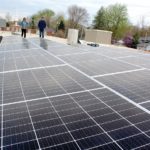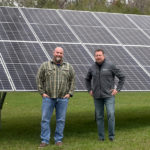The semifinalists will each receive $50,000 in cash, plus two teams were awarded a $25,000 bonus cash prize for their participation in the Justice, Equity, Diversity, and Inclusion (JEDI) contest, which seeks solutions that enable underserved communities to overcome systemic barriers to solar deployment.
December 9, 2022Anne Fischer
The U.S. Department of Energy (DOE) Solar Energy Technologies Office announced the 20 teams selected to advance to the semifinal stage of the multi-million dollar American-Made Solar Prize Round 6. The American-Made Solar Prize is a multimillion-dollar competition funded by the U.S. Department of Energy (DOE) and designed to promote solar innovation in the United States through a series of contests.
The program includes three prize competitions, called the Ready!, Set!, and Go! contests. In the Ready! contest teams focus on innovative ideas that will address a solar industry technology need, proving that they have developed a great team, a game-changing solution, and a plan. In the Set! contest, teams begin developing and demonstrating early-stage proofs-of-concept. And in the Go! contest teams try to prove that their solutions work, and they must show substantial progress throughout the contests. work and they have made substantial progress over the course of the contests.
In April, the DOE announced the 20 finalist teams chosen after they pitched their concepts for during Set! Demo Day events. In September, Round 5 finalists were announced.
The semifinalists in Round 6 will each receive $50,000 in cash. In addition, two teams were awarded a $25,000 bonus cash prize for their participation in the Justice, Equity, Diversity, and Inclusion (JEDI) contest, which seeks solutions that enable underserved communities to overcome systemic barriers to solar deployment.
The semifinalists in Round 6 who will move on in the competition are:
Photovoltaics (PV)
Mirai Solar: Retractable Solar Modules for Buildings and Beyond (Mountain View, Calif.)PI Energy: Ultra-Thin Flexible Solar PV, for More Surfaces (San Diego, Calif.)Beam Solar: The Beam Module: PreFab Solar for Commercial Roofs (San Francisco, Calif.)Noria Energy: Autonomous Cable-Free Anchoring for Floating Solar (Sausalito, Calif.)Portable Solar: Ground-Based Mounting System for Rural Solar (Miami, Fla.) – JEDI Contest WinnerSolTek Nano: Maximize Efficiency (Las Vegas, Nev.)Snow-Free Solar: Facilitating Snow Removal from Solar Panels (Toledo, Ohio)RUTE Foundation Systems: Clearing the Hurdle of High-Cost Agrivoltaics (Portland, Ore.)Crack Catcher AI: Crack Catcher AI (Klamath Falls, Ore.)
Systems Integration
ReJoule: Second Life Solar (Signal Hill, Calif.)Vellex Computing: Grid-on-a-Chip: Accelerating Solar Interconnection (Sunnyvale, Calif.)Grid Edge Management: World’s Most Reliable Inverter (Cary, N.C.)
Concentrating Solar-Thermal Power (CSP)
Hawai’i Innovation: Deployable Off-grid CSP Desalination with MEDAD (Honolulu, Hawaii) – JEDI Contest Winner
Finance and Business Models
SandBox Solar: SolarBound Build Confidence Build Trust Build Solar (Fort Collins, Colo.)Edgeli: Shared Data, Smaller Queues, More Interconnections (Portland, Maine)Hail Cat: Identify, Quantify, and Mitigate Hail Risk (San Jose, Calif.)
System Operations
Latimer Controls: Latimer Controls Enables Intelligent Solar Power (Boulder, Colo.)SatAlpha: Autonomous Solar Panel Inspections (New York, N.Y.)
System Design
Solesca: Advancing Agrivoltaics (Chicago, Ill.)LEAF: Solar Design Assistant (Akron, Ohio)
These teams will go on to compete in the next round of the competition, which will end in April 2023. Learn more about the American-Made Solar Prize.
This content is protected by copyright and may not be reused. If you want to cooperate with us and would like to reuse some of our content, please contact: editors@pv-magazine.com.





















Recent Comments